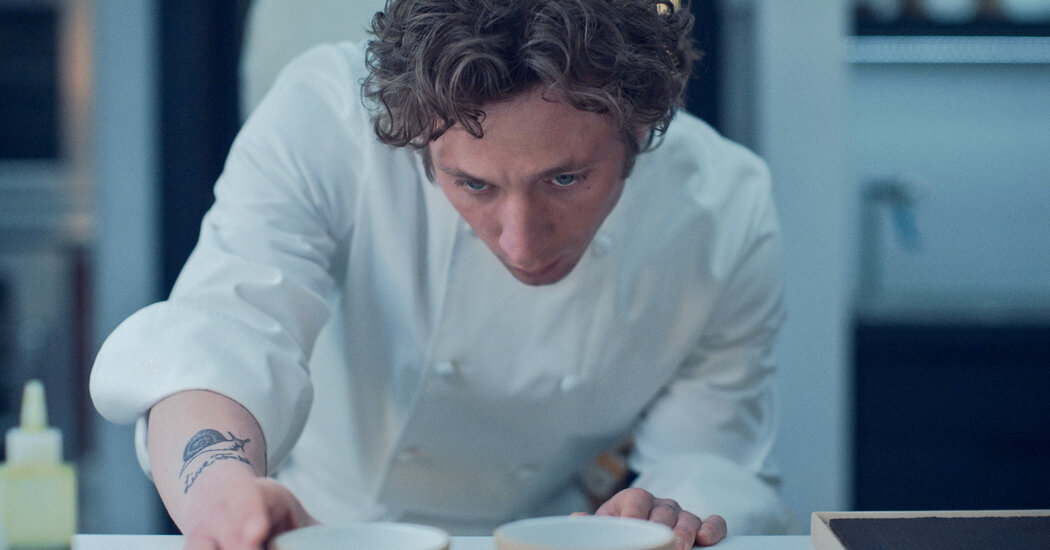In its third season, “The Bear,” a television show known for its dedicated hyperrealism, did not disappoint fans looking for real-world culinary references. As Carmy (Jeremy Allen White), Sydney (Ayo Edebiri) and their team of former sandwich professionals hustled for a Michelin star or two at their newly opened fine-dining spot, Easter eggs dotted the show. We’ve compiled a short list, with help from restaurant industry professionals, of the most true-to-life nods and hidden surprises:
In certain corners of Reddit, it is rumored that the entire show is loosely based on the life of the chef Curtis Duffy, an owner of Ever restaurant in Chicago. But, while the creators have dined at his restaurant, “If they were studying me, I didn’t know it,” he said.
The photos of the restaurant critics posted in the Bear office are of actual people, including the New Yorker writer Naomi Fry, the “How Long Gone” podcaster Chris Black and Sue Chan, who runs the culinary events and marketing agency Care by Chan.
On the show, Marcus, the pastry chef played by Lionel Boyce, makes a “caviar sundae.” A similar dish was served at the renowned, now-closed restaurant 108 in Copenhagen, a culinary hotbed to which “The Bear” has referred numerous times.
In flashbacks to Carmy’s time at the French Laundry, Thomas Keller’s restaurant in the Napa Valley, a sign beneath the clock reads, “Sense of Urgency.” “That sign sits under every clock in every restaurant Thomas Keller has,” said Nick Fitch, a co-owner of Alston Hospitality Group who spent 12 years working the dining room at the French Laundry and Per Se.
The Pilot G2 Gel Roller Pen, with a .07-millimeter tip that Carmy uses to furiously scribble throughout the season (and to write his list of “non-negotiables”) caught the eye of Greg Ryan, a co-owner of Bell’s in Los Alamos, Calif. who worked in the dining rooms at Per Se and the French Laundry for more than five years. “When I was an expediter, those were just the pens you had,” he said. “They work well on receipt paper, don’t smudge, have a fine tip and write super-smoothly.”
Much has been made of Mr. Keller’s chicken-trussing demonstration — “If you ask him his favorite dish, he’ll say roast chicken,” said Mr. Fitch — but a photo of his handprint cast in concrete also makes an appearance in the season’s first episode. According to Mr. Fitch, the handprint was initially in the kitchen at the French Laundry but was extracted during an extensive renovation and moved outside, along with handprints from Corey Lee, a former French Laundry chef de cuisine, and Claire Clark, a former pastry chef at the restaurant.
Joel McHale, who plays Chef David, said on “Late Night With Seth Meyers” that he was “portraying” Mr. Keller. “I don’t think he’s as awful as I was, but he does whisper at his employees,” Mr. McHale said. Others have speculated that the character is based on Daniel Humm, the chef at Eleven Madison Park. Will Guidara, a producer on “The Bear,” was a business partner of Mr. Humm’s until the two had a tense public split. Mr. McHale said in a GQ interview this week that “David is apparently based on Thomas Keller and Daniel Humm,” and added, “There wasn’t any material. I’ve never met them.”
In Episode 2, Carmy calls a dish of sea bass topped with potato chips a “Boulud nod,” as in Daniel Boulud, the renowned chef who created crisp paupiettes of sea bass in Barolo sauce. That dish uses thinly sliced potatoes as a crust for a skinless fillet, and Mr. Boulud has in turn credited a mullet dish made by Paul Bocuse as his inspiration.
The tip-versus-service-charge conversation among the Bear’s staff touches on a hot-button issue that’s playing out all over the country. Many restaurateurs, most famously Danny Meyer, have tried to create a better system, with mixed results. In California, a recently passed law seemed to make restaurant service charges illegal (as part of a bid to reduce hidden fees), but then a second bill was passed, allowing restaurants to keep those fees if they are presented clearly.







